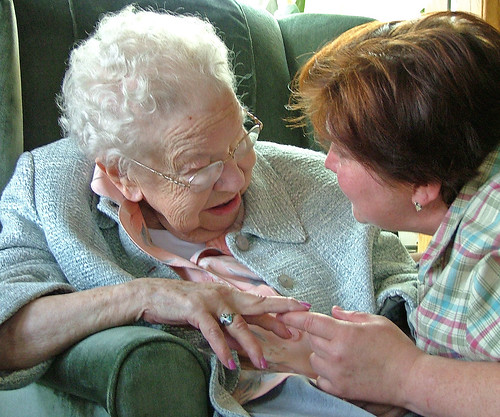The focus of mid-stage Alzheimer's is a decline in functioning of many body systems at once and steadily increasing dependence on caregivers. In mid-stage Alzheimer's disease, the cognitive problems of early Alzheimer's get worse and new ones develop. Memory and cognition problems become severe; communication becomes warped; and the personality is transformed.
 The person has a marked change in appearance and hygiene as they become less and less able to take care of themselves. Physical problems increase, including problems with voluntary control of the body, and health declines. Wandering, aggressiveness, hallucinations, and paranoia appear.
The person has a marked change in appearance and hygiene as they become less and less able to take care of themselves. Physical problems increase, including problems with voluntary control of the body, and health declines. Wandering, aggressiveness, hallucinations, and paranoia appear.This stage is the longest. Those sufferers who are able to recognize their own decline are especially at risk for becoming suicidal during this stage.
The range of problems that may occur include the following:
Significant cognitive decline and memory problems continue
- Forgets recent events, forgets their own history. When they can't remember something, they may make up something instead.
- Increasing difficulty in sorting out names and faces of family and friends, but can still distinguish familiar from unfamiliar faces
- Still knows their own name, but no longer remembers their own address or phone
- Loses track of their own possessions. May take others belongings.
- Can no longer think logically or clearly. Can't organize their own speaking or follow others logic. Can no longer follow written or oral instructions or a sequence of steps. Arithmetic and money problems escalate.
- Disoriented about the season, the day of the week, the time of day
- Disconnected from reality. Does not recognize self in the mirror. May think that a television story is real.
- Problems with speaking, understanding, reading, and writing
- Repeats stories, words, and gestures; repetitive questions
- May still be able to read, but cannot respond correctly
- Problems finishing sentences
- May revert to their first speaking language (and need a multilingual caregiver)
- Apathetic, withdrawn
- Anxious, agitated
- Unmannerly, aggressive or threatening
- Suspicious, paranoid; may accuse spouse of having an affair, or accuse family members of stealing
- Delusional, has hallucinations. May hear, see, smell, or taste things that aren't present
- May have an exaggeration of their normal personality characteristics
- Inappropriate sexual behavior: may mistake another person for their spouse, may disrobe or masturbate in public
- Rummages through things, hides things
- Restlessness, pacing, repetitive movements: fingers certain objects over and over; tries doorknobs; hand-wringing; tissue-shredding
- Wandering, including chatting to oneself while wandering. May wander away from the caregiver and familiar, safe surroundings. (One-quarter to one-half of all people with Alzheimer's wander.)
- Disruption of the normal sleep-wake cycle: sundowning (naps during the day, active from late afternoon through the night)
- Needs help dressing appropriately for the weather or occasion. May need help putting clothing onto the correct body part.
- Needs help with grooming: bathing, brushing teeth, combing hair
- Needs help using the toilet
- May no longer be safe when left alone: could fall, burn self, poison self, neglect self. Although able to care for self in some ways, needs full-time supervision for safety.
- Urinary and fecal incontinence increase over time
- Has trouble getting comfortable in a chair or on the toilet
- Muscle twitches


No comments:
Post a Comment